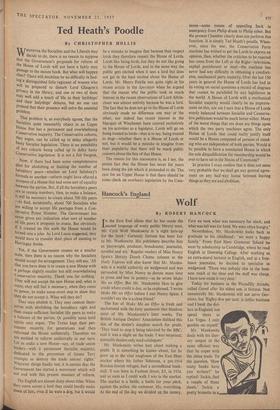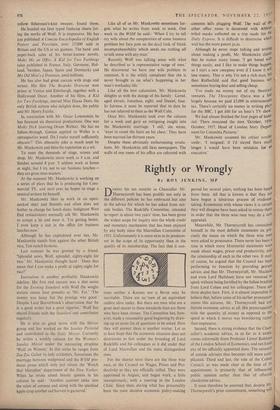Hancock's England
Wolf
HANCOCK By ROBERT
The fun of Make Me an Offer is fresh and uncluttered with the fatty sentiment that blankets most of Mr. Mankowitz's later works. The British Antique Dealers' Association disliked this tale of the dealer's sleepless search for profit. `They tried to stop it being televised by the BBC; said it was a slight on the trade. I was surprised; normally dealers only read catalogues.'
Mr. Mankowitz writes best about making a profit. It is something he knows about, for he grew up in the vital toughness of the East Ham market where his father Solomon, a pre-1914 Russian-Jewish refugee, had a secondhand book- stall. 'I was born in Fashion Street, El, in 1924, and as soon as I could walk I was in the market. The market is a battle, a battle for your. pitch, against the police, the customer, life, everything. At the end of the day we divided up the money.
First we took what was necessary for stock, and what was left was for food. We were often hungry.'
Nevertheless, Mr. Mankowitz looks back in gratitude to his childhood : 'we were a happy family.' From East Ham Grammar School he went by scholarship to Cambridge, where he read English at Downing College. After working as an extra-mural lecturer in English, and as a free- lance journalist, he decided to specialise in wedgwood. 'There was nobody else in the busi- ness much at the time and the stuff was cheap. I have now made it very dear.'
Mr. Mankowitz deals with his liter- ary output in the same efficient way that he copes with the china trade. To the question, 'How many books have you written?' he replied: 'Jackie, find a couple of those sheets.' Jackie, a pretty brunette in a yellow fisherman's-knit sweater, found them.
He handed me four typed foolscap sheets list- ing the works of Wolf. It is impressive. He has just published A Concise Encyclopedia of English Pottery and Porcelain, over 15,000 sold in Britain and the US at six guineas. The hard- and paper-back sales of his better-known novels, Make Me an Offer, A Kid for Two Farthings (also 'Sweden, in France, Italy, Germany, Hol- land, Sweden, Japan, Spain and Denmark) and My Old Man's a Dustman, total millions.
He has also had great success with stage and screen. His film The Bespoke Overcoat won prizes at Venice and. Edinburgh, together with a Hollywood Oscar. Another of his films, A Kid for Two Farthings, starred Miss Diana Dors, the only British actress who delights dons, the public and Mr. Henry Fairlie.
In association with Mr. Oscar Lowenstein he has financed six theatrical productions. One was Moby Dick (starring Orson Welles). 'He has no follow-through. Genius applied to Welles is a retrospective word. Do I make myself sufficiently obscure?' This obscurity joke is much used by Mr. Manko(vitz and dims his reputation as a wit.
To meet the demands of stage, screen and shop, Mr. Mankowitz starts work at 9 a.m. and finishes around 8 p.m. 'I seldom work at home at night, but I try not to eat business lunches— they are great time-wasters.'
At the moment Mr. Mankowitz is working on a series of plays that he is producing for Com- mercial TV, and next year he hopes to stage a musical written by himself.
Mr. Mankowitz likes to work in an open- necked shirt and flannels and often does not bother to change for lunch dates. Indignant West End restaurateurs normally ask Mr. Mankowitz to accept a tie and wear it. 'I'm getting better, I even keep a suit in the office for business lunches now.'
Although he has capitulated over ties, Mr. Mankowitz stands firm against the other British vice, Test match hysteria.
Last summer he was greeted by a friend. 'Splendid news, Wolf, splendid; eighty-eight for two.' Mr. Mankowitz thought hard : 'Does that mean that I can make a profit at eighty-eight for two?'
Journalism is another profitable Mankowitz sideline. His first real success was a diet series for the Evening Standard with Wolf (he weighs sixteen stones four pounds) as 'Mr. Fat.' The money was lousy but the prestige was good.' Despite Lord Beaverbrook's observation that 'he is a good writer but a poor reporter,' Wolf has stayed friends with the Standard and contributes regularly.
He is also on good terms with the Mirror group and has worked on the Sunday Pictorial and contributed to the Daily Mirror. Currently he writes a weekly column for the Woman's Sunday Mirror under the interesting strapline 'Wolf on Women.' In this series he ranges from Zsa-Zsa Gabor to lady cricketers. Sometimes the marriage between wedgwood and the WSM pro- duces prose which only just misses the 'Watch that Metaphor' department of the New Yorker. When he wrote about beauty queens in his column he said : 'Another summer sinks into the mists of autumn and along with the speckled apple crop another sad harvest is garnered.' Like all of us Mr. Mankowitz sometimes for- gets what he writes- from week to week. One week in the WSM he said : 'When 1 try to tell my wife about the complexities of some business problem her face puts on the dead look of blank incomprehensibility which sends me rattling off to talk sense with any man.'
Recently Wolf was talking sense with what he described as 'a representative range of men.' He discovered 'we have one wife problem in common. It is the wifely complaint that she is never brought ' in on what's happening in her man's workaday life.'
Like all the best columnists, Mr. Mankowitz delights us with the doings of his family : Gered, aged eleven; Jonathan, eight; and Daniel, four. In fairness it must be reported that to date he has not referred to them as the Wolf Cubs.
Once Mrs. Mankowitz took over the column for a week and gave an intriguing insight into the Mankowitz marriage. 'I still,' she wrote, 'want to count the hairs on his chest.' They have been married for thirteen years.
Despite these obviously embarrassing revela- tions, Mr. Mankowitz still likes newspapers. The walls of one room of his office are coloured with contents bills plugging Wolf. The wall of the other office room is decorated with African tribal masks collected on a trip made for the Daily Express. It is difficult to determine which wall has the more potent ju-ju.
Although he never stops talking and writing about making a profit, Mr. Mankowitz claims that he makes many losses. 'I get bored with things easily, and I like to make things happen' so I start a new company even if I know it will lose money. That is why I'm not a rich man, but then Rothschild said that good business was sometimes buying dear and selling cheap. 'I've made no money out of my theatrical ventures. The Threepenny Opera was a loss largely because we paid £5,000 in entertainment tax. There's certainly no money in writing plaYs, for the BBC. I got £60 for an hour's TV shoW We had almost finished the four pages of hand' out. There remained the item 'October, 1956' October, .1957, Head of London Story Depart' ment for Columbia Pictures.'
Mr. Mankowitz assumed his enfant terrible smile : resigned; if I'd stayed there much longer I would have been mistaken for an executive.'











































































 Previous page
Previous page